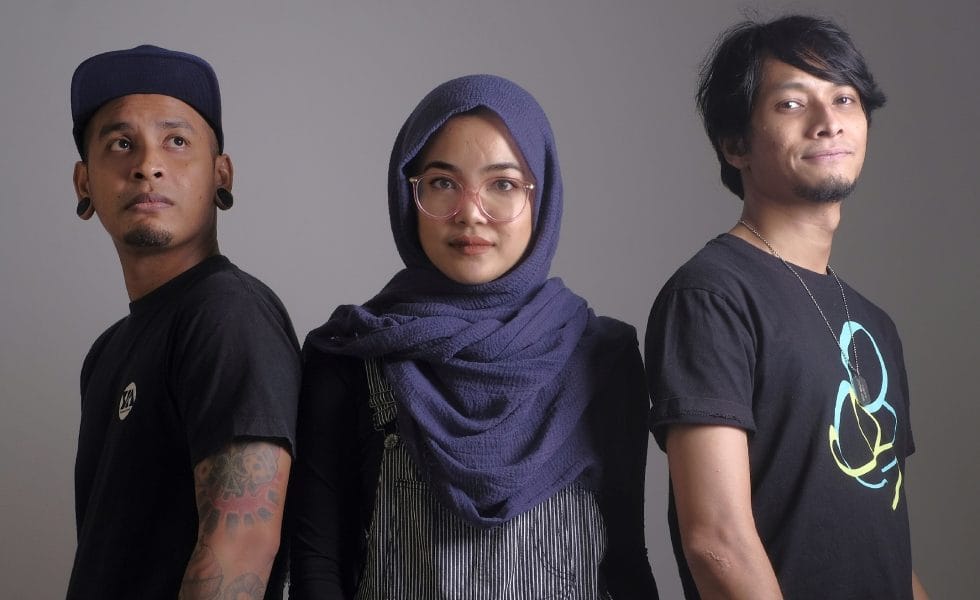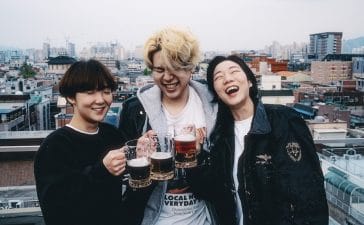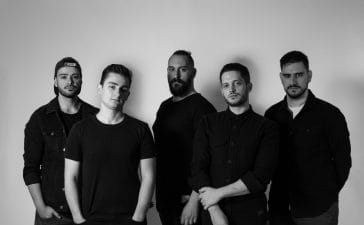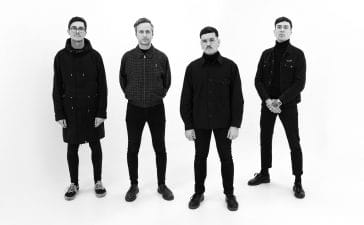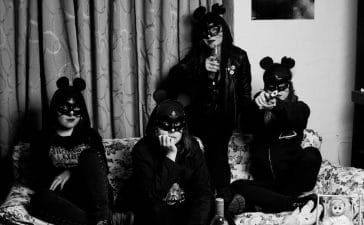More than 31 million people make up the population of our Pacific neighbour to the north, Malaysia. At around 25 million, Australia isn’t too far behind, but when you consider that Malaysia is around 23 times smaller in landmass, that puts things into perspective. It’s a country heaving with culture, both old and new. If an idea exists on this planet, there’s a safe bet it’s found its way into Malaysia – including punk, as we see with three-piece Ix Chel.
Based in capital Kuala Lumpur, Ix Chel are achieving what few punk bands do anywhere, for that matter, pricking up ears all over the world. Vocalist/guitarist Ana and drummer Aizad were kind enough to talk us through how punk rock and alternative culture took shape in their hometown, with Vocalist/bassist Galang, from neighboring Jakarta, sharing some facts about Indonesia.
How did you become a punk?
Galang: Growing up in Jakarta & Bali, my late elder brother was always listening to punk bands such as Sex Pistols, Cock Sparrer, GBH, Madness, The Specials and many more. As a kid he influenced me a lot, from style, mind set and music. As I grew up, I started listening to Minor Threat, Fugazi, RKL, No Use For A Name and Lagwagon. I got hooked on NOFX when I was in high school and then I became a street punk for a while. I was then focused on my career as a musician and writing music.
Ana: I have 2 brothers who were skinheads. I was very young and couldn’t really understand what it all meant but I’ve always enjoyed the songs they listened to and the way they dress. That sparked my interest right away.
Aizad: Honestly, I got into punk quite late. Being a kid I was really into all kinds of music, collecting whatever cassettes and CDs I could. A dear old friend was into trading cassettes, so he introduced me to The Ramones, Green Day and a few local bands. I loved how uncomplicated the music was but it sticks with you. Then I started finding other bands, I was really into the lyrics at that point. Dug deeper and deeper. Until today I am still digging and learning things.
Growing up as a young punk in your hometown, what are some of the places you would hang out?
Ana: Back in the ’90s they would hang out at Central Market (CM), Pertama and Campbell Complex, Medan MARA food court and Kotaraya Complex in Kuala Lumpur. Today we have a place called Rumah Api; a punk space and house, a place for gigs, for misfits, for conducting workshops and meetings, which is also a record store and library! It was demolished due to new highway constructions but has since relocated to Pandan Indah.
Aizad: Around the early 2000s, we would take the very convenient LRT train and go hang out by the fountains outside of KLCC. There would be punks and skinheads everywhere, everyone just catching up with old friends and making new ones.
How would you describe a typical punk from your hometown?
We might differ a little in appearance. You might spot someone with a Sex Pistols t-shirt, someone with a full on mohawk or someone who dresses up totally normal. Still, we live in equality. All for one, one for all. It’s hard to pin down a typical punk here.
How does the general community in your hometown take to punks and punk music?
Galang: The general community would be agitated by our appearance and think of us as a threat even though we were just hanging out without bothering anyone.
Ana: If you dressed up a certain way and listened to loud music, people would simply label you as “Black Metal” or a “Satan Worshipper”.
Aizad: Back in the ’90s and early’ 00s the authorities went after kids who dressed up “differently”. Gigs were often raided, cassettes and CDs confiscated for dumb reasons. News and stuff on TV really distorted people’s views. That had a long-lasting negative effect against punks, skinheads and metalheads.
What do you think is the biggest threat to the punk community in your city?
Galang: Even though the punk community is a minority in Bali, we still have a strong bond. Before the COVID pandemic, once a week there were events for the punk community. We’re always trying to keep a tight-knit family, and grow it at the same time.
Ana: People don’t understand our music, our culture. They are just happy listening to formulaic sappy love songs. So, punk music doesn’t get the exposure it deserves as much as the others.
Aizad: For me, it’s simply a judgmental mind set. Malaysia being quite a conservative nation, folks will automatically think something bad is brewing when they see a group of people with studs and mohawks. You and your friends might be walking to catch a gig and they’d call the cops on everyone. Worse when these types are the people with power and influence. Unfortunately, we have a too much of them.
All over the world politics and punk go hand in hand. What are some of the political issues that influence punks in your hometown?
One of the biggest political issues we’ve always faced is corruption. Also, cronyism. When the right job goes to the wrong guy, that creates all kinds of problems for everyone. This has always been a frustrating problem for us.
Are there any other locations in the city that are important to its punk community?
Galang: There are lots of places, I can say every province in Indonesia have those especially in Jakarta, Bandung, Jogjakarta and Bali. Back in the 2000’s in Bali, Electrohell and Suicide Glam were the famous local clothing brands, and Twice Bar was the famous venue for punks.
Aizad: Huge shout out to the legendary Kedai Auntie at Campbell Complex! People have been going there for the longest time to get the best underground/international music and merch.
Who are some great punks or punk bands making moves from your hometown we can check out?
Super Glad, Superman is Dead, Marjinal (Indonesia). The Garrison, ACAB, The Bollocks (Malaysia).
What are your tips for any punks travelling through your hometown?
Galang: Indonesian people are very welcoming and friendly people, just be your self.
Aizad: Be sure to drop by the places we’ve mentioned above. You will definitely meet like-minded people and be welcomed with open arms!


